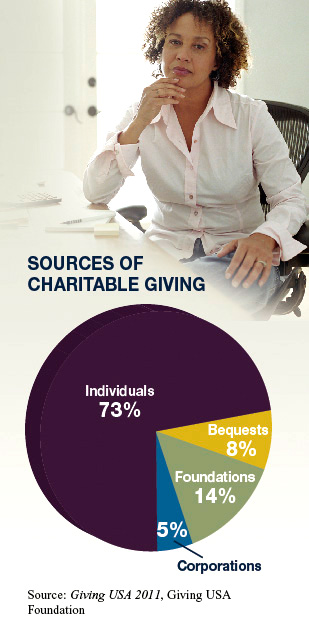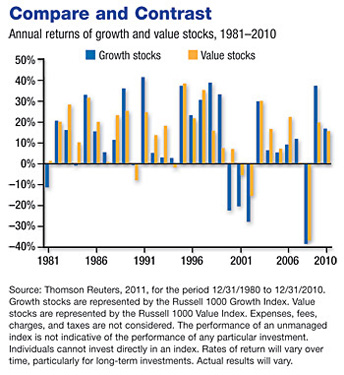Investment in exchange-traded funds (ETFs) has grown substantially since the first ETF was introduced in 1993. Total ETF assets exceeded $1 trillion in March 2011, up more than $200 million over the previous year.1
Until recently, conservative investors may have felt left out of the ETF marketplace because the available options were largely based on stocks. That is changing. There are now 140 bond-based ETFs with assets representing about 14% of the total ETF market.2 Bond ETFs generally track major fixed-income indexes that might focus on short-term, intermediate-term, or long-term bonds. They offer some appealing opportunities for the risk-averse.
Mutual Funds Meet Stocks
Like mutual funds, ETFs comprise a portfolio of securities assembled by an investment company. They typically track an index, market sector, or other group of securities and offer investors flexibility in structuring their portfolios to meet specific goals and risk tolerances, as well as a level of diversification that would be cost-prohibitive if the underlying securities were purchased separately. This is especially true of bonds, which typically carry face values of $1,000. Diversification does not guarantee against loss; it is a method used to help manage investment risk.
 Unlike mutual funds, whose shares are generally bought from and sold back to the mutual fund and priced once a day at the close of business, shares of ETFs trade like stocks throughout the day. Supply and demand for the shares may cause them to trade at a premium or a discount relative to the value of the underlying shares.
The principal value of ETFs and mutual funds will fluctuate with changes in market conditions. Shares, when sold, may be worth more or less than their original cost. Bond ETFs are subject to the same inflation, interest-rate, and credit risks associated with their underlying bonds. As interest rates rise, bond prices typically fall, which can adversely affect the performance of a bond ETF.
The attraction of ETFs over mutual funds comes from their trading flexibility, generally lower expense ratios, and greater tax efficiency. Be mindful, however, that you must pay a brokerage commission to purchase ETF shares. Given the growing availability of ETFs, there may be several to choose from that could be appropriate for your risk profile.
Exchange-traded funds and mutual funds are sold by prospectus. Please consider the investment objectives, risks, charges, and expenses carefully before investing. The prospectus, which contains this and other information about the investment company, can be obtained from your financial professional. Be sure to read the prospectus carefully before deciding whether to invest.
1–2) Investment Company Institute, 2011
The information in this article is not intended as tax or legal advice, and it may not be relied on for the purpose of avoiding any federal tax penalties. You are encouraged to seek tax or legal advice from an independent professional advisor. The content is derived from sources believed to be accurate. Neither the information presented nor any opinion expressed constitutes a solicitation for the purchase or sale of any security. This material was written and prepared by Emerald. © 2011 Emerald Connect, Inc.
Unlike mutual funds, whose shares are generally bought from and sold back to the mutual fund and priced once a day at the close of business, shares of ETFs trade like stocks throughout the day. Supply and demand for the shares may cause them to trade at a premium or a discount relative to the value of the underlying shares.
The principal value of ETFs and mutual funds will fluctuate with changes in market conditions. Shares, when sold, may be worth more or less than their original cost. Bond ETFs are subject to the same inflation, interest-rate, and credit risks associated with their underlying bonds. As interest rates rise, bond prices typically fall, which can adversely affect the performance of a bond ETF.
The attraction of ETFs over mutual funds comes from their trading flexibility, generally lower expense ratios, and greater tax efficiency. Be mindful, however, that you must pay a brokerage commission to purchase ETF shares. Given the growing availability of ETFs, there may be several to choose from that could be appropriate for your risk profile.
Exchange-traded funds and mutual funds are sold by prospectus. Please consider the investment objectives, risks, charges, and expenses carefully before investing. The prospectus, which contains this and other information about the investment company, can be obtained from your financial professional. Be sure to read the prospectus carefully before deciding whether to invest.
1–2) Investment Company Institute, 2011
The information in this article is not intended as tax or legal advice, and it may not be relied on for the purpose of avoiding any federal tax penalties. You are encouraged to seek tax or legal advice from an independent professional advisor. The content is derived from sources believed to be accurate. Neither the information presented nor any opinion expressed constitutes a solicitation for the purchase or sale of any security. This material was written and prepared by Emerald. © 2011 Emerald Connect, Inc.
Investment in exchange-traded funds (ETFs) has grown substantially since the first ETF was introduced in 1993. Total ETF assets exceeded $1 trillion in March 2011, up more than $200 million over the previous year.1
Until recently, conservative investors may have felt left out of the ETF marketplace because the available options were largely based on stocks. That is changing. There are now 140 bond-based ETFs with assets representing about 14% of the total ETF market.2 Bond ETFs generally track major fixed-income indexes that might focus on short-term, intermediate-term, or long-term bonds. They offer some appealing opportunities for the risk-averse.
Mutual Funds Meet Stocks
Like mutual funds, ETFs comprise a portfolio of securities assembled by an investment company. They typically track an index, market sector, or other group of securities and offer investors flexibility in structuring their portfolios to meet specific goals and risk tolerances, as well as a level of diversification that would be cost-prohibitive if the underlying securities were purchased separately. This is especially true of bonds, which typically carry face values of $1,000. Diversification does not guarantee against loss; it is a method used to help manage investment risk.

Unlike mutual funds, whose shares are generally bought from and sold back to the mutual fund and priced once a day at the close of business, shares of ETFs trade like stocks throughout the day. Supply and demand for the shares may cause them to trade at a premium or a discount relative to the value of the underlying shares.
The principal value of ETFs and mutual funds will fluctuate with changes in market conditions. Shares, when sold, may be worth more or less than their original cost. Bond ETFs are subject to the same inflation, interest-rate, and credit risks associated with their underlying bonds. As interest rates rise, bond prices typically fall, which can adversely affect the performance of a bond ETF.
The attraction of ETFs over mutual funds comes from their trading flexibility, generally lower expense ratios, and greater tax efficiency. Be mindful, however, that you must pay a brokerage commission to purchase ETF shares. Given the growing availability of ETFs, there may be several to choose from that could be appropriate for your risk profile.
Exchange-traded funds and mutual funds are sold by prospectus. Please consider the investment objectives, risks, charges, and expenses carefully before investing. The prospectus, which contains this and other information about the investment company, can be obtained from your financial professional. Be sure to read the prospectus carefully before deciding whether to invest.
1–2) Investment Company Institute, 2011
The information in this article is not intended as tax or legal advice, and it may not be relied on for the purpose of avoiding any federal tax penalties. You are encouraged to seek tax or legal advice from an independent professional advisor. The content is derived from sources believed to be accurate. Neither the information presented nor any opinion expressed constitutes a solicitation for the purchase or sale of any security. This material was written and prepared by Emerald. © 2011 Emerald Connect, Inc.





